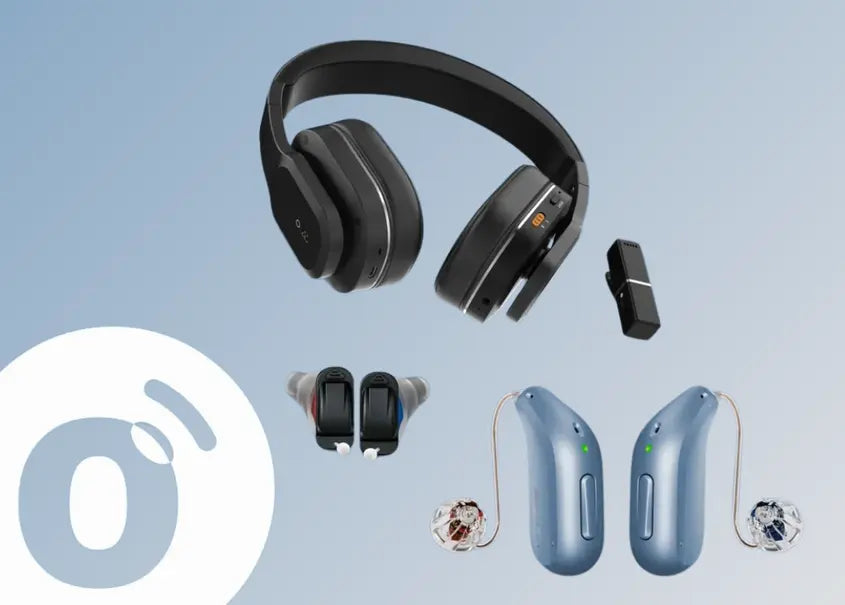When faced with hearing loss, there are many solutions, but it's easy to get lost. Among them, hearing amplifiers and hearing aids are often confused, even though they meet very different needs and regulatory frameworks. Understanding these distinctions is crucial to making an informed choice that's right for your situation. At Spokeo, we're committed to providing you with clear information to guide you toward the best hearing solution.
Definition of listening amplifiers
A hearing amplifier, also called a PSAP (Personal Sound Amplification Product), is an electronic device designed to amplify environmental sounds to make them more audible. It is a simpler technology than medical hearing aids.
What exactly is a hearing amplifier?
A hearing amplifier is a non-medical device that captures sounds, amplifies them, and transmits them to the ear. It is generally intended for people with normal hearing or mild to moderate hearing loss who wish to improve their ability to hear in specific situations (group conversations, television, lectures).
Basic operating principle
The way it works is relatively simple: a microphone picks up the sound, an electronic circuit amplifies it equally across all frequencies, and then an earphone plays it into the ear. There's no fancy customization involved.
Regulatory framework and status
The distinction is fundamental: hearing amplifiers are not medical devices. They are therefore not subject to the same strict regulations as hearing aids and can be sold without a prescription or adjustment by a hearing professional.
Evolution of the amplifier market
The hearing amplifier market has seen the emergence of increasingly sophisticated products, bridging the gap with hearing aids and offering advanced features, leading to the emergence of a new category: hearing aids.
Fundamental differences between amplifier and hearing aid
To fully understand the role of each solution, it is essential to compare them on key points:
Technology and signal processing
Hearing amplifiers provide a raw amplification of sound, often equally across all frequencies. They do not effectively distinguish speech from ambient noise. Hearing aids , on the other hand, are medical devices equipped with advanced technologies (multi-channel, intelligent noise reduction, feedback cancellation, microphone directionality) that process the sound signal in complex ways to precisely compensate for the user's specific hearing loss.
Personalization and adaptation
A hearing aid is custom-programmed by a hearing care professional based on the patient's unique audiogram . This fine-tuning is crucial for optimal hearing correction. Hearing amplifiers, on the other hand, offer only basic volume settings or a few preset listening modes, without individual customization.
Acquisition process and monitoring
Purchasing a hearing aid requires a medical prescription, a comprehensive hearing assessment, and regular testing and adjustments with a professional. For a hearing amplifier, the purchase is direct, often online or in a pharmacy, without professional guidance.
Cost and accessibility
Hearing aids are generally more expensive due to their advanced technology and associated professional service, although they are often reimbursed. Hearing amplifiers are significantly more affordable and accessible, requiring no consultation or prescription.
Advantages and disadvantages of classic amplifiers
Although simpler, listening amplifiers have advantages but also significant limitations:
Immediate accessibility without prescription
This is their main advantage: the possibility of quickly obtaining hearing support without the constraints of a medical journey.
Attractive price and ease of use
Their cost is a major selling point for those on a budget. Their use is intuitive, often limited to a simple volume adjustment.
Technological limitations
Conventional amplifiers amplify all sounds, including background noise, which can make listening uncomfortable and understanding difficult in noisy environments. They are not designed for specific hearing losses.
Risks of inappropriate amplification
Excessive or inappropriate amplification can potentially damage remaining hearing if not used wisely and knowingly.
When to choose a hearing amplifier or a hearing aid?
The choice depends on the nature and degree of your hearing loss, as well as your needs and expectations.
Mild Hearing Loss: Signs and Symptoms
If you occasionally have difficulty following conversations in noisy environments, or hearing quiet sounds, but it doesn't pose a major handicap in your daily life, a hearing amplifier or, better still, a new-generation hearing aid could be a good first step.
Occasional vs. Daily Use
Amplifiers are best suited for occasional use in specific situations (watching television, listening to a specific conversation). For consistent, personalized hearing correction, especially for more significant hearing losses, a medical hearing aid remains the gold standard.
Transition period before a medical device
An amplifier or hearing aid can serve as a first step for people who are hesitant to take the plunge with medical equipment, allowing them to get used to sound amplification.
Budgetary considerations and social security coverage
With cost being a key factor, hearing amplifiers represent a more financially accessible solution, without the need for a large investment or reimbursement procedures.
The Evolution to Modern Listening Assistants: Spokeo Technology
The market has seen the emergence of a new category of devices that bridge the gap between simple amplifiers and sophisticated hearing aids: listening assistants. Spokeo is fully in line with this innovation.
New generations of amplifiers
These devices incorporate more advanced sound processing technologies than basic amplifiers, offering better listening quality, more effective noise reduction, and sometimes even limited customization via apps.
Advanced technologies like Spokeo
Spokeo is a great example of this new generation. It offers high-quality sound amplification thanks to its patented bi-conductor technology and a directional microphone (Smart Mic) that isolates the speaker's voice. These innovations allow for sound clarity far superior to that of conventional amplifiers, even in the presence of ambient noise or earwax plugs . In addition, it is ready to use and easy to use, without requiring complex settings, making it a perfect solution for caregivers who want to support their loved ones.
Compromise between simplicity and performance
Hearing aids like Spokeo represent an excellent compromise: they are more powerful than simple amplifiers, easier to access than medical hearing aids, and do not require a prescription or restrictive audiological monitoring. They are particularly suited to people who are losing their independence or who are resistant to traditional hearing aids.
Future of Accessible Listening Solutions
The future of hearing solutions is moving toward increasingly smart, connected, and easy-to-use devices, aiming to democratize access to better hearing for a wider audience. Innovations like Spokeo's are at the forefront of this trend, offering solutions for healthcare professionals and facilities alike.
Ready to make the right choice for your hearing?
Discover Spokeo, the modern listening assistant that combines simplicity and performance for clear listening every day.
Discover the Spokeo BoxThis article is provided for informational purposes only and is not a substitute for professional advice. If you have any concerns or experience symptoms of hearing loss, it is important to consult an ENT specialist or audiologist for an accurate diagnosis and personalized advice.













